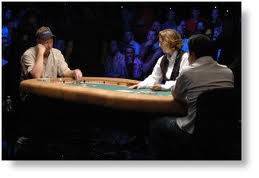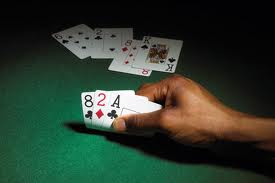Playing Hands Heads-up in Seven Card Stud
 As many seven card stud players know, your overall profits improve greatly when you play lots of extra hands in advantageous situations. And many of these situations arise when you’re heads-up in stud games. That said, here is some advice about playing heads-up in seven stud on third street – beginning with the type of opponents you should seek out.
As many seven card stud players know, your overall profits improve greatly when you play lots of extra hands in advantageous situations. And many of these situations arise when you’re heads-up in stud games. That said, here is some advice about playing heads-up in seven stud on third street – beginning with the type of opponents you should seek out.
Poor Opponents mean Big Money
It goes without saying that the worse your heads-up opponent is, the more money you stand to make. After all, being isolated with a bad player gives you an excellent shot to take advantage of them and make profits in stud games. Of course, it will take some observation skills on your part to spot weak seven card opponents.
Some of the things that you really want to look for are players who are really transparent with their stud cards, play too many marginal hands, and overvalue big pairs and two pairs. The last point is especially important in stud games because these opponents will pay your big hands off.
Playing Speculative Hands
While big pairs are always nice in heads-up situations, you can also make a lot of money off speculative hands by the time seven cards are dealt. For example, let’s say that you’ve got Jc-9d-8s, and an opponent with a door card of 9c makes a raise.
Judging from their previous play, you strongly believe that this player has a pair of 9’s among their stud cards. This has you beat right now, but you also have to consider that their chances of improving to a set is diminished since you’ve got one of their 9’s. Furthermore, if your hand is totally live, you have a chance to make a straight.
 Taking all of the factors from this stud game situation into account, this could be a good time to call the raise if everybody else has folded. Your chances of long-term profitability are only improved when you are up against an opponent who’ll pay you off at the end of seven cards.
Taking all of the factors from this stud game situation into account, this could be a good time to call the raise if everybody else has folded. Your chances of long-term profitability are only improved when you are up against an opponent who’ll pay you off at the end of seven cards.
Don’t be Afraid to Fold
No matter how bad the seven card opponent you’re facing, sometimes your situation gets worse on fourth street and you need to fold. Using the previously described stud game scenario where you have Jc-9d-8s against a probable pair of 9’s, let’s assume that you’re dealt a 4h on fourth street while the opponent gets another 9.
Based on this horrible turn of luck, it appears highly likely that your seven stud opponent has gained the advantage here; this is especially the case if they come out and make another raise. Long story short, be willing to ditch your stud cards on fourth street or later when the situation gets away from you.
What if Somebody Else calls a Raise?
So far, we’ve only discussed heads-up situations in stud games. However, there will be plenty of situations that arise where you think you’re going to be heads-up, but another player or two calls the initial raise.
For instance, let’s say you’re in an 8-handed game and a weak player in early position raises; you call this raise since there are no overcards acting later. However, your plans to be heads-up with this poor seven card opponent are ruined when another player calls the raise in late position.
Assuming this happens in a stud game, you’ll need a solid card to land on fourth street (provided you don’t already have strong stud cards). If nothing good comes on fourth street, you should be prepared to fold your stud cards and wait for a better opportunity.
Keep your Observation Skills Sharp
As we discussed earlier, it’s always great to be heads-up against bad opponents in stud games. So make sure to watch your opponents closely whenever you’re playing in a stud game. Over time, you’ll get better at this and hopefully make more money in the process.
